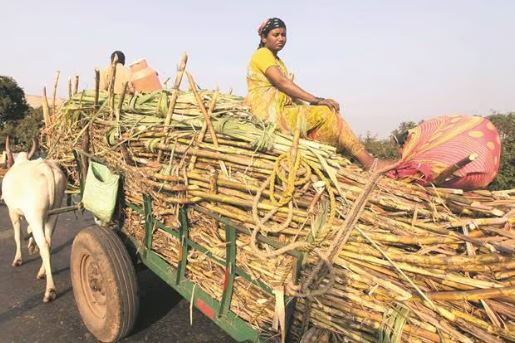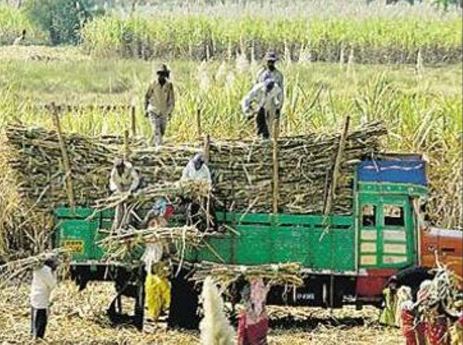Fifteen year old Savita
Landge from Lahuri village
in Maharashtra’s Beed district is already two months
into married life.
Recounting memories before her wedding, Savita says her parents, both sugarcane cutters, would take her and her two younger brothers to the sugarcane fields, where the children would contribute to the labour by tying or cutting the crop. “My parents wanted to marry me off as soon as I attained puberty. I am lucky that it took me two years longer than usual, because they couldn’t cobble together enough money to arrange for a wedding,” says Savita, a Class 6 dropout. “When I expressed my desire to go to school to my husband and inlaws, they dismissed the idea, asking me to focus on chores,” she adds dolefully. This scenario of child marriage among sugarcane workers is a prevalent practice in these parts of Maharashtra, The Hindu
finds after visiting 15 villages and hamlets in Beed, Latur and Osmanabad
districts.
Another such example is 17yearold Sandhya Khade who was married at 13. Her husband, an autorickshaw driver, was 21 at the time. “Child marriage is not a strange concept. We ready ourselves for it the moment we start menstruating,” she says, expressing gratitude, meanwhile, to her parents for marrying her to an autorickshaw driver instead of a sugarcane farmer, thus freeing her from a life of endless toiling in the fields. Sandhya’s two sisters, aged 13 and 14, are both
married too. “Dowries are less for girls between the ages of 12 and 14,” Sandhya explains, adding that after that, the demand for cash, gold, or motorbikes increases. Why the rush?
Most of the families living in this region of Marathwada migrate to the fields to cut sugarcane when the season demands. Eighteen year old Mayuri Subodh Kumar’s mother Bindu Datta is of the opinion, like many other parents, that it is unsafe to take unwedded girls along to the field, where scores of men work. Meanwhile, leaving them behind is risky, too, opening up chances for them to be raped, or elope with a lover, thus bringing shame to the entire family.
“By marrying them off early, we avoid all those situations,” says Ms. Datta, a resident of Ambejogai in Beed district.

Incongruent data Data from the Ministry of Women and Child Development show that across
Maharashtra, there were 13 reported instances of child marriage in 2018, 20 in 2019, 50 in 2020, and 82 in compiled by an NGO, the Committee of Resource Organisation, show that 10 instances of child marriage took place in 2018, 30 in 2019, 45 in 2020, and 71 in 2022, in the districts of Beed and Latur alone. Meanwhile, local social workers say that unreported cases far outweigh reported ones. Kaushalya Chandrakant Thorat, who works as a field coordinator for Navchetana Sarvangin Vikas Kendra, a grassroots NGO run by single women based in Kaij taluka in Beed, says she has to face endless opposition every time she or an NGO worker tries to stop a child marriage. Parents, she says, are terrified that their girls will never find a husband if they are sexually violated. President of the Rajashri Chhatrapati Sahu Maharaj Pratishthan NGO in Beed and former member of the Child Welfare Committee Tatwashil Kamble adds that a solution is needed to
combat the social and economic challenges in the area. “Since 2012, we have been demanding residential hostel facilities and work opportunities in the villages, so that migration rates can come down,” Mr. Kamble says. Half baked solutions In June 2021, a chance for
change finally emerged with the approval of the Sant Bhagwan Baba Government Hostel scheme by the State Cabinet. The then Social Justice
Minister, Dhananjay Munde, had announced that the government would sanction the construction of 82 hostels, with free food and accommodation for the children of sugarcane cutters and migrant workers.
In the first phase of the scheme, 10 talukas, picked across several districts, were sanctioned 20 hostels. However, Mr. Kamble says that currently, only nine of the 12 hostels in his area are operational, and suffer from a lack of infrastructure and manpower. “Running the hostels, which house over 500 children, with over half being girls, is difficult considering we have only two women wardens and five male wardens. We have been requesting more in the Ustod Kamgar Mahamandal [a body set up for the welfare of sugarcane workers] meetings, but to no avail,” says Prashantm Dashrath Ugale, an employee at the Social Welfare Department in Beed.
